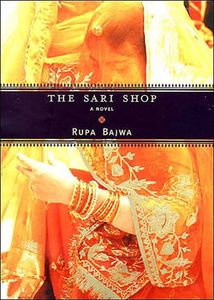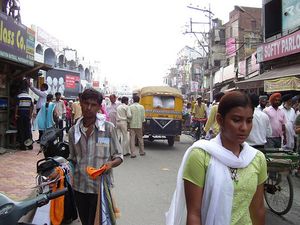The sari shop
Publié le 18 Juin 2014
The little world of The sari shop (2003) feels very familiar; Rupa Bajwa clearly belongs to it, not only because she’s from Amritsar, where the scene takes place exclusively, but also because she’s on the side of the crowds of people who mill around its streets, which one can sense immediately as soon as one opens the book. There is some drama in the story, as we shall see, and a direction, which follows its main protagonist, a little sari salesman who goes by the name of Ramchand; but all in all what makes its substance is the evocation of the town, rather desperately stuck in a rut which cannot be changed single-handedly, but also full of a life which Arun Kolatkar might have chosen to write about. It’s much better than just going there as a tourist, because when you leave its crowded alleyways, its colourful bazaars and long-gone crumbling ramparts (you can’t see them any more but the town retains the disposition which they imprinted on it), as you open the book, you are plunged into the shop, with its domineering boss (Mahajan), the oily snakelike owner who terrorizes everyone when he appears (he’s called Bhimsen), the little community of individualized salesmen: Ramchand, the frail idealist, Gokul, the pacifier, Hari the youngest of the lot, who cannot yet be trusted for anything, Chander the tall and dark one who’s often absent, and finally Shyam and Rajesh, two older employees who conspire to have more time off than the rest because they’re older employees.
Familiar again (and pleasantly so) is their daily routine, the hard work they all have to put in (except Shyam and Rajesh), the relationships between each of them with Mahajan, his swearing and moods, the little shop’s vibrant life which intensifies as soon as clients arrive, and then we notice how each one of them has chosen a speciality among the shop’s articles: the saris, the chunnis, the lehngas. Rupa Bajwa’s pen is dipped into the finest ink when she retells the conversations between the city’s ladies, as they sit down in front of their practiced sari-walah, and start bargaining each in their own way. We hear their stories, their plans for their children, and of course the most important plans of all, the weddings! Because naturally if they’re there, it’s because they need the newest and the best attire for a wedding happening in their family, of at which they’ve been invited, and they’re experts about the quality of the material, the fringes, the pallus… They know exactly (or at least they give this impression) which hue they’re after, which origin, which price bracket; they have in mind the social standard associated with the quality they need. And in front of them the little team of salesmen are like fleeting shadows who mimic their gestures, opening sari-boxes, fetching articles from the shelves, unfolding brightly coloured silks which push them even further back into the undifferentiated grey or drab of their unimportant lives. The rich customers hardly have a word for them, they hardly see them. Once a bevy of school-girls enters, led by their teacher, and the girls romp and tease her in front of everyone. It’s innocent enough, but it reasserts the salesmen’s position as menials and not professionals.
Rupa Bajwa
Ramchand is the “hero” of The sari shop, and even if this title seems sadly lacking in lustre, we’ll see that in fact he’s that, at his own level. The author pictures him in his little room, which needs a repaint and a brighter bulb. He’s the tenant of a family next door, among which Sudha, the young and lissom mother, who goes about her house chores in front of Ramchand’s window, and he fantasizes as he watches her come and go. We are told about Ramchand’s youth, how he became an orphan at six, how he idolized his parents and the subsequent life he’s led among other people of his family, until the day when he’s asked to fend for himself. His experience of an exile from his family, and as a stranger in the foster family later on are going to develop in him a sense of a duplicated self: on the one hand the Ramchand who lives in the real world, and then like a shadow another Ramchand who dreams of a world of harmony and quiet peace, like the peace he once used to feel when he was sent to his grandmother near the river, because his uncle couldn’t take him on holiday with the rest of the children. This poetic and dreamy side of his seemed reflected in his name.
Little by little we witness him uneasy and dissatisfied at work; when the story starts, he’s been working at the sari shop for 11 years, and apart from little excursions to Lakhan’s dhaba nearby, he seemed locked in a daily, monthly and even yearly routine of wake, work, sleep - wake, work, sleep. Only the occasional outing to see a movie breaks the spell, or rather makes it liveable. Increasingly worried and inwardly pestering against a life he hasn’t chosen, he knows there’s something wrong. So one day, remembering some books somebody had lent him, he figures he could start learning English. His parents had boasted before their death that they would send him to a school which would guarantee him this social sesame. It’s very nice to see him bargain for the books - a dictionary (which he will actually read, starting with A), a children’s reader, and later, a learner’s “scientific experiments” - and bring them back home on his grimy table which, because of the occasion, will receive its once in a lifetime cleanup! Ramchand discovers thanks to his naive perusals that “there’s two sides to every coin” – and whereas to every cultivated student of life this proverbial statement means nothing in terms of involvement, to him it’s like a revelation: unencumbered by scholarly-taught relativism, he’s made to look at social and moral truth anew, and suffers henceforth for it like only pure souls will.
While Ramchand begins working with a passion, having found a new meaning and purpose in life, he’s also sent to deliver some saris at a wealthy villa, belonging to a Kapoor clan member. It’s a great opportunity to watch his elation as he cycles there, is made to enter and to observe everything around him. Such luxury and grandeur is of course eons from his own life, but it’s fun examining the lives of the local rich through his eyes. Typically, the little sari-wallah is invisible, as in Ralph Ellison’s novel; what he sees or hears isn’t anybody’s concern, and the assumption is that even if he heard anything worth repeating, nobody would weigh his word as equal as that of the powerful family whose secrets he might have discerned. The second opportunity for him to enter the magical world of the R&F is when, informed of the date of the wedding, he wants to walk past the function that night, and is caught by the guards near the premises. Confused, he mumbles that he’s been invited by the bride! The guards thus escort him to Rina Kapoor, and she most surprisingly lets him stay. Unknown to him, she’s an aspiring writer: she’s felt there could be something to write about in this little character. Some time after the wedding, Ramchand is visited at the shop by the young lady-author: she’s come to know a little about his life, and gather information for her book! Naturally he’s very frightened at first, thinking that she’s come to denounce him for having trespassed at her wedding, and he answers very badly. He cannot fathom what she really wants.
Anyway this is a rather good trick on Rupa Bajwa’s part: ironically, she’s making her character the hero of another book-in-the-book story, thus somehow cancelling the impact that any aspect of Ramchand’s fight (as we are about to see) might have had. Whatever he’s done, it’s only the subject for a novel, it will never be played in the harsh social or political reality of today’s India… Even his attempts to learn how to read and write are caught in the trap of words, as opposed to the real world of action. What enables people to weigh on the destiny of the country isn’t learning, but influence, caste and rank. Now of course, this has an implication for the author Rupa Bajwa herself: can she hope change things in India through her writings? Apparently, her first book (this one) brought her prizes and praise, but her second (Tell Me a Story) stirred up a lot of controversy. What makes the difference between “useful” books and escapist ones? How can one stir readers to act and change things if the main function of books (and entertainment in general) is recognized as pleasant pastime?
There’s another important character in the book: Kamla, Chander’s wife. We’ve seen that Chander works at the sari shop, but is often silent or absent. Once Ramchand is sent by Majajan to tell him he has to be back at work, and he meets his wife, a seemingly vulgar, violent, boisterous individual who shoves him aside with a glare. He’s been told that she’s responsible for Chander’s distress, that she’s the cause of all his worries. Chander beats her and tries to bang some sense in her head, nothing works! She’s just a bad lot, and has resorted to drinking, the worst thing that can happen to a woman in the prejudice-filled understanding of feminine duties. But we learn that she’s been the victim of ruthless economic measures when her husband was working for a wealthy consortium of which the aforementioned Kapoor household was partner. Unemployment, shock and subsequent loss of child have afflicted her. Then another time Ramchand meets Kamla close, Chander being away. She’s just back from the police station, almost dying from the brutal treatment received there. I won’t disclose what she’s done, but we’re suddenly plunged in Rohinton Mistry’s universe (see here) and you’ll also have to read the book to discover what Ramchand’s reaction will be: it’s full of the idealism and anger which has grown through out the book, and even if it’s doomed, because Ramchand is a nobody, he’s the only one to stand up and “do the right thing”.
To finish, let’s listen to one of Rupa Bajwa’s characters whom I take as a mouthpiece for a number of potential readers who would prefer to continue reading books as a source of entertainment only, and disregard whatever “other side” the shining coin might display, if you happen to turn it over:
“She glared at him. ‘How dare you’ she in a low, angry hiss, her voice trembling’. ‘How dare you, a mere shop assistant, bring me here to this corner and tell me filthy stories about the kind of women you seem to know…. The Guptas are respectable people. They happen to be friends of the Kapoors. Do you know what you are saying? And why are you telling me? What have I to do with this dirty business? ... She said speaking through clenched teeth… I don’t want to listen to all that vulgar rubbish again, that too in Hindi. Why are you bothering me about all this? It is of no concern to me… There have been some horrible, filthy things going on, and now respectable people are to be dragged into it.”
/image%2F1489169%2F20200220%2Fob_9722d6_banner-11.JPG)




